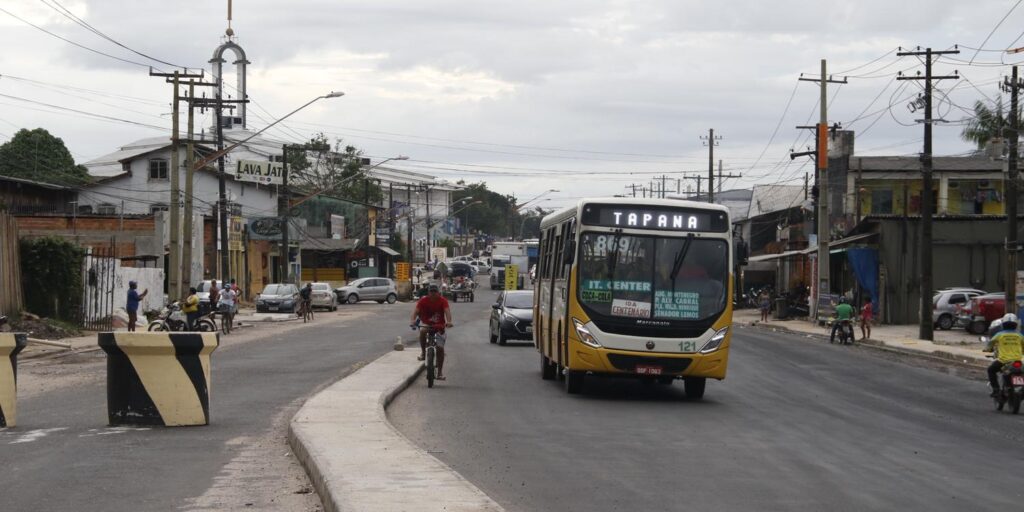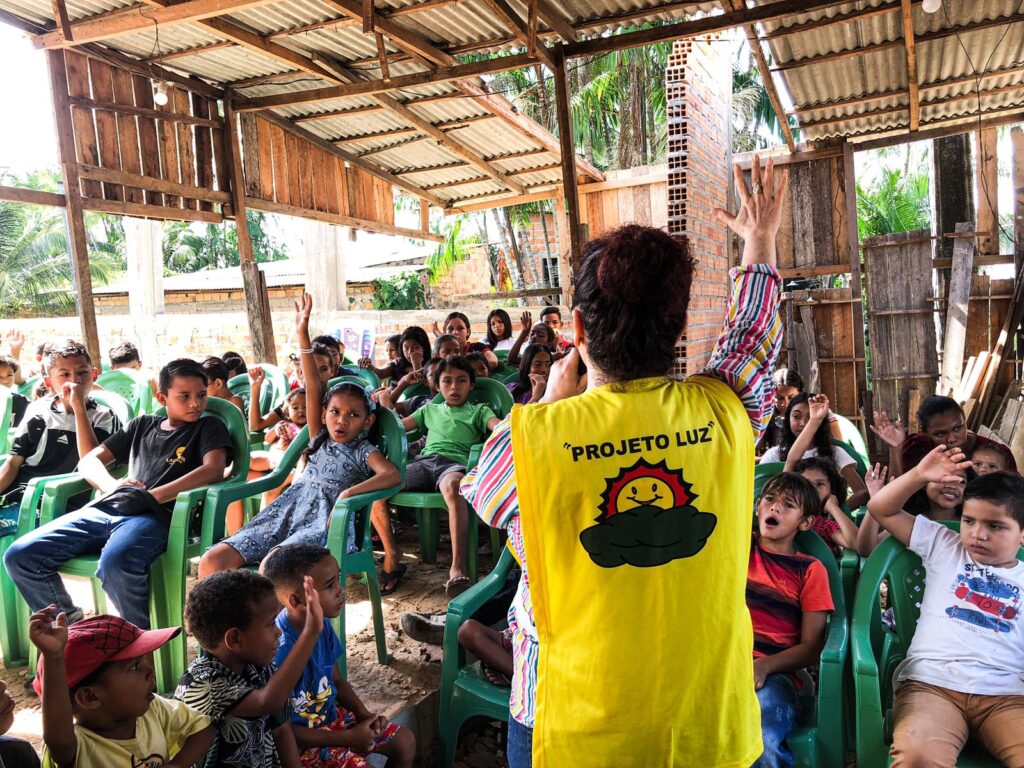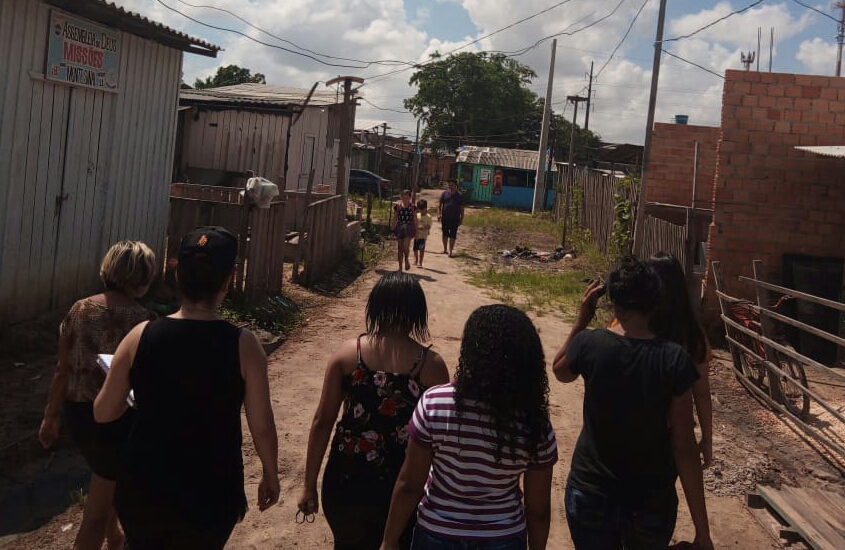Hi, I’m Joe Barros, allow me to share the essence of our mission at RocksmithClub, a non-profit organization where love, grace, and music form the core of our work. We’re dedicated to transforming remote and vulnerable communities by addressing illiteracy, hunger, and violence.
Belém, a city steeped in over 500 years of rich culture, is home to vibrant people, exquisite cuisine, and architectural marvels, including century-old opera houses. It’s a city where deep faith and tradition converge, making it one of the most devout Catholic cities globally. There, the annual veneration of the Virgin Mary draws over 3 million people, seeking grace, miracles, and a glimpse of heaven.
Next year, Belém’s global significance will be further amplified as it hosts the COP30, where world leaders will strategize on combating global warming. Yet, amidst its celebrated history and cultural heritage, Belém conceals a lesser-known narrative within the Tapanã neighborhood, historically referred to as Hospedaria do Inferno (Hell’s Inn).
Previously known as “Pouso do Tapanã”, the neighborhood that today bears the same name began to be occupied during the rubber boom. It was an area initially composed of large farms. And one property in particular was very well known: the Tapanã inn, which became known as “Hospedaria do Diabo” or “Hospedaria do Inferno”. That’s because the “rubber soldiers”, mostly from the Northeast, suffered all kinds of abuse in that place.

For those in need of a quick history lesson on these terms: during World War II, Brazil entered into agreements with the United States to supply the Allied Forces with rubber. This led to a significant recruitment of individuals who would become known as “rubber soldiers,” tasked with the mission of extracting and producing rubber in the Amazon rainforests. Many of these recruits were impoverished individuals, deceived by promises of recognition, wealth, and a new life.
On the way through Belém, the rubber soldiers were staying in a shed in terrible conditions. It was the “Pouso do Tapanã”, the “Hospedaria do Inferno” or the “Hospedaria do Diabo”, as portrayed by the Doctor of History Lara de Castro, from the Federal University of Bahia. It was where the promises of three good meals a day were not fulfilled without considerable productive compensation from the workers. Many people were hungry and practically lived in a regime of slave labor.
The rubber cycle ended, the war ended, and many people, somehow, continued to look for opportunities in the business. And they continued on to the Tapanã inn. There was no internet and communications were difficult. There was no way to warn others not to go into that situation. The historical estimate is that at least 63,000 people passed through the hostel and then were unable to return home. Suffering was a tonic in the daily life of those who were left to their own devices.
Obviously, there was no way a shed could hold everyone. Soon, the forgotten rubber soldiers and their families began a process of occupation of the neighborhood. Some farms were invaded, housing nuclei were forming. Still far from what would become the “pot crowd”, as portrays a melody that reinforces the pride and love for the neighborhood that residents have, despite everyday problems. By the way, this is a story about the neighborhood’s identity that is practically lost due to lack of records. Even in this the neighborhood is needy. “The occupation of the Tapanã neighborhood is largely due to the transformation of rural land, formerly farms into urban land, based on the interest of the real estate capital. It is known about the existence of the Val-de-Cans farm, which extended to part of what is today the Tapanã neighborhood.
The notable layout of large blocks between Avenida Augusto Montenegro and the Arthur Bernardes highway, extending to Pinheiro (now the District of Icoaraci), reflects Tapanã’s development amidst poverty and social inequality. Despite some progress due to real estate speculation, such as improved housing and infrastructure, and the arrival of companies like Brasilit, Frimapa, and Socipe promising jobs and social transformation, many in Tapanã remain unemployed, mirroring a national issue.
Architect and urban planner José Júlio Ferreira Lima highlights the real estate market’s surge along Augusto Montenegro, including the rise of vertical condominiums following horizontal ones, bringing retail, supermarkets, and malls. However, this development hasn’t equated to genuine progress, as parts of Tapanã lack infrastructure and accessibility. Situated in a key development zone of Belém and encircled by major roads, Tapanã faces unseen safety, sanitation, and health challenges.
José Júlio emphasizes the need for improved access within Tapanã to enhance its value and address historical issues. He advocates for integrating Tapanã with neighboring areas, launching housing initiatives for the low-income demographic, and regulating land use to prevent environmental damage, underscoring the importance of sustainable development and community support to truly uplift Tapanã.
This backdrop of historical and cultural complexity sets the stage for our work at RocksmithClub.

In the intriguing corridors of Hell’s Inn, there is a small light that shines brightly. “The Small Light Christian School”, led by Sonia Negrão. Sonia and her team dedicate their lives to teaching neighborhood children to read and write, grounding their lessons in biblical principles.
The pandemic of 2020 was a period of trials for all of us. It was during this time, amid isolation and uncertainty, that I sought to reconnect with old friends, including Sonia Negrão.

The challenge Sonia shared with me was desolate. After 20 years of dedication, Little Lights faced its greatest crisis. With the lockdown imposed by the government, keeping the school open seemed impossible. The small light that shone in Hell’s Lodging was about to go out.”
This conversation was a turning point for me. The idea of losing Little Lights was unacceptable. It was then that, inspired by this urgency, we at the RocksmithClub devised a plan. Simple? Perhaps. Crazy? Definitely. But it was a plan that could save the school.”

The plan was reimagined: instead of shutting down, why not boldly break through the gates of Hell’s and rescue more children, offering them a chance to learn at Small Lights?
The crisis showed us that the challenges we face – illiteracy, hunger, and violence – are interconnected. But it also revealed a powerful truth: the solution begins with love, grace, and music.”
With love for education, we at the RocksmithClub, along with our partners and supporters, committed to paying 50 dollars a month so that a financially disadvantaged child can study at Little Lights. But we didn’t stop there.”

“To combat hunger, we added another 20 dollars per child to buy a monthly basic food basket for a family of four. We believe that no child can focus on their studies on an empty stomach.”
And to address violence, we invested another 20 dollars per child to equip the school with musical instruments. Music has the power to heal, to unite, and to inspire. Through it, we teach more than notes and rhythms; we teach respect, discipline, and cooperation.”
This is our three-part plan to eradicate illiteracy, hunger, and violence. With each child we help, we are planting seeds of change that will grow and transform the entire community.” Today we have 10 children rescued from hell. Little lights shining brighter than the midday sun.
I believe that Jesus’ promise about the gates of hell not prevailing against the church’s advance is only a reality when the church moves in love.
Go to hell with your love.
Join us in the battlefield.

Joe Barros | rocksmithclub.org
ph:240.476.0733



Leave a Reply